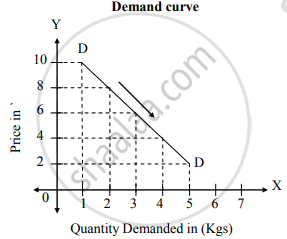Advertisements
Advertisements
Question
State with reason whether you agree or disagree with the following statement.
There is an inverse relationship between price and demand.
Solution
I agree with the given statement.
Reason:
- The law of demand states that, “Other factors remaining constant, when the price of a commodity rises, demand for it falls and when the price of a commodity falls, demand for it rises.”

- In the above diagram, Y-axis represents price and the X-axis represents quantity demanded. DD is the demand curve which slopes downward from left to right. It represents inverse relation between price and quantity demanded.
APPEARS IN
RELATED QUESTIONS
Briefly explain any two reasons for the occurrence of the law of demand.
Complete the following statement:
Symbolically, the functional relationship between Demand and Price can be expressed as ______.
Find the odd word
Assumptions to law of demand -
Increase in demand is caused by
In case of relatively more elastic demand, the shape of the curve is
Distinguish between extension and contraction of demand.
Explain the law of demand and its exceptions.
Write a statement of the Law of Demand.
State with reason whether you agree or disagree with the following statement :
When price of Giffen goods fall, the demand for it increases.
State and explain the law of demand with the help of a hypothetical schedule and graph.
The following table shows the demand schedule for 3 consumers in a market.
| Price in (Rs) | Consumer 1 Demand in (kgs) | Consumer 2 Demand in (kgs) | Consumer 3 Demand in (kgs) | Market Demand |
| 10 | 1 | 2 | (i) ______ | 6 |
| 8 | 2 | (ii) ______ | 4 | 9 |
| 6 | 3 | 4 | 5 | 12 |
| 5 | 4 | 5 | 6 | (iii) ______ |
Based on the above hypothetical schedule answer the following questions.
- What is the demand of Consumer 3 priced at Rs 10 (i)
- What is the demand of Consumer 2 priced at Rs 8 (ii)
- Calculate the total market demand priced at Rs 4 (iii)
- From the above given table examine the relationship between price and demand.
- Mention any one exception to the law of demand.
Any statement about demand for a good is considered complete only when the following is/are mentioned in it:
If with the rise in price of good Y, demand for good X rises, the two goods are:
When at a price of ₹ 5 per unit of a commodity, A's demand is for 11 units, B's demand is for 14 units and C's demand is for units (assuming that there are only three consumers in the market), the market demand is ______.
Giffen goods are richman's goods
If a good is inferior good, then purchases of that good will decrease when ______.
Pick the option which does not belong to the group:
State the law of demand.
What is meant by the income effect of a fall in the prices of a commodity?
Explain four circumstances under which the law of demand does not operate.
Identify the correct statement from the following alternatives:
The following table shows the amount of sugar bought by a household at different prices:
| Period | Price (₹ per kg) | Amount Bought (kg) |
| Jan. 2000 | ₹ 15 | 4 |
| Feb. 2000 | ₹ 16 | 5 |
Does the behaviour of household contradict the law of demand? Give reasons in support of your answer.
State whether the following statement is true or false. Give reasons.
The law of demand states a direct relationship between price and demand.
